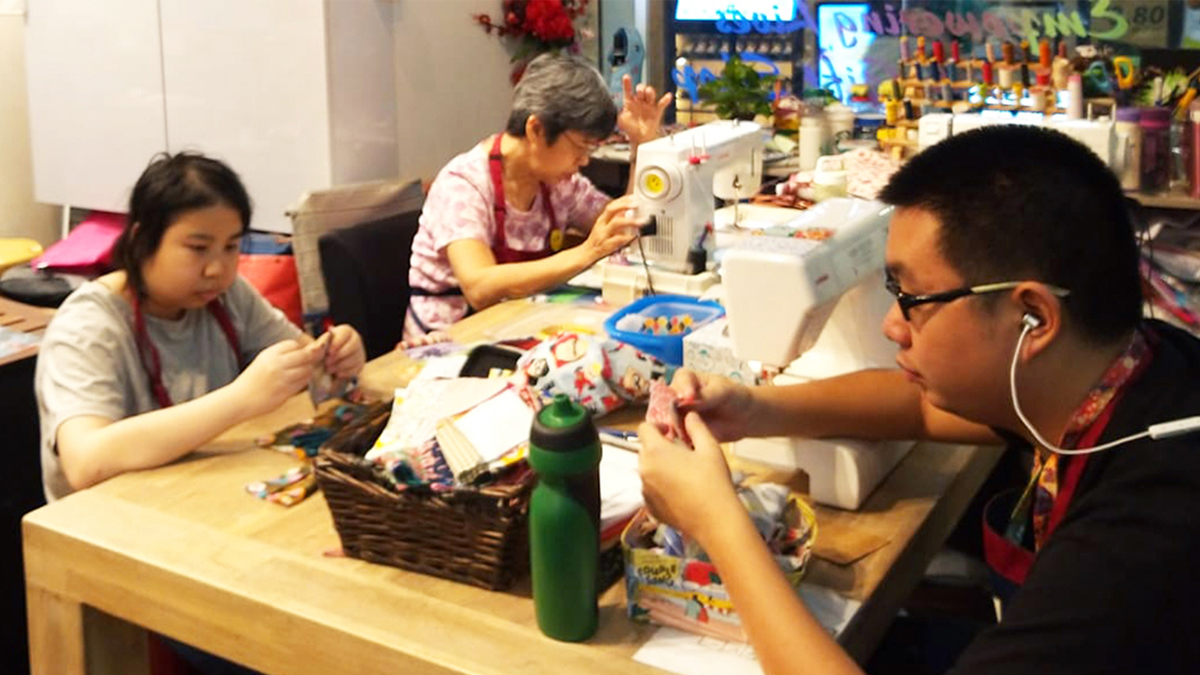Financial Planning | Life | Personal Finance | Personal Stories | Article
What It’s Like Raising a Child With Special Needs
by Sophia | 12 Nov 2019 | 7 mins read

The founders of Mustard Tree, a Singaporean social enterprise for special needs children and youths, were inspired primarily by their son, Ryan, who was diagnosed with autism at a young age. This comes with its challenges; while raising a child in Singapore can reportedly go up to $670,000, it’s a different story altogether when you’re raising a child with special needs.
As the term implies, “special needs” means there’s much more to consider – especially financially. To find out more about these additional needs and costs to bear, I reached out to Mustard Tree for an interview to better understand what a parent of a special needs child would have to go through.
The Day-to-Day
Soek Ying faces each and every day expecting the unexpected. “You can plan and schedule as much as you like, but how your day begins and ends is depending on your child,” she explained to me.
“On his ‘off days’ you may find him stimming away or experiencing a meltdown,” she said, referring to the act of repeating physical movements or sounds to deal with external stimuli for people on the autism spectrum. “You pretty much can’t get him to do anything – and neither can you. Everything has to be put on hold.”
This means a lot of waiting, often leading to frustration and helplessness – especially when a special needs child is having a tough time, but there’s nothing a parent can do to help him. And Soek Ying is no stranger to this feeling.
“A million thoughts will run through your head, and a bleak future typically comes to mind,” she said.
“What’s going to happen to him when you’re no longer around?”

Medical Costs and Special Diets
It’s not just emotional support and a physical presence that parents must steadily supply, either. Financially, raising a special needs child is different from that of neurotypical children. Soek Ying says there are a lot of expenses to consider.
“Ryan was diagnosed with autism at around age 2, and diagnosis involved seeing a pediatrician and psychologist,” she said. “There were many tests and assessments to be done. Depending on whether you’re at a government clinic or seeing private practitioners, the cost can range from $100 to $150 per hour for consultation.”
The hefty price tag doesn’t stop there. Assessment reports are charged separately, according to Soek Ying. Parents need to be aware about the different types of assessments, from speech and occupational therapy to being looked at by a psychologist.
Diet is also another concern that needs to be closely looked at and managed. “Your child may need special diets, like gluten-free, casein-free (GF/CF) diets,” Soek Ying explained. “But going on a GF/CF diet is challenging and expensive.”
It’s believed that special needs children can’t process food with gluten and casein, or may have allergies triggered by these food components. Soek Ying mentioned that some people have reported “improvement in behaviour, speech, and attention” after removing gluten and casein from diets.
“We did it for Ryan for a while and thought there was some improvement in his stimming and attention,” she said. “But GF/CF foods and ingredients could be limited; when we lived overseas for a while, I had visiting friends help to bring these foods over.”
From managing diets to paying off heavily medical costs, there’s a lot of financial support needed to take a special needs child through their formative years and beyond. Soek Ying noted with relief that both her and her husband are “gainfully employed,” but highlighted that they are still “prudent with finances” as they also have other children.
Preparing Your Special Needs Child for Financial Management
I asked Soek Ying about how parents could best prepare their special needs children for a future time where they may not be around any longer. How will they handle or manage their own assets or inheritance? What about figuring out things like insurance plans or managing huge sums of money?
“When your child turns 21, he is a legal adult in the eyes of the law. As parents, we cannot legally manage his affairs,” Soek Ying said. “But it’s natural for us to think that they are our responsibility.”
To properly manage the affairs of your child, you’d have to apply to the Family Court to be deputised. But there are financial costs to consider, Soek Ying reminds us.
“Consider assessment costs; a medical report needs to be submitted during the application, along with legal fees.”
But parental support can only go so far until age and time come for us all. In the absence of their parents, what support can special needs children find?
One solution could be the Special Needs Trust Fund, set up by the government and managed by the Special Needs Trust Company.
“It helps caregivers plan their children’s finances for when they’re no longer around,” Soek Ying said. “Their representatives will help you with the financial planning for your child.”
And as for other financial needs such as insurance, since special needs children already have certain pre-existing conditions, Soek Ying pointed me to recent initiatives taken by the government to cover autism. These plans are under NTUC Income.
Recognising Their Son’s True Potential
Aside from taking care of Ryan and nurturing his growth, his parents have been busy on other fronts. Mustard Tree, their social enterprise, was a result of being inspired by their son.
Both founders believed that Ryan had plenty of learning runway and potential to be nurtured and developed. They were adamant about not wasting resources poured in over the last 16 years.
Soek Ying explains, “He’s not high enough on the spectrum to access open employment, but neither is he too challenged that he requires support at a Day Activity Centre (DAC). He’s not very verbal, and is cognitively slower with sensory challenges to a certain extent. But on the other hand, he’s got good visual learning and motor skills.”
Because of their belief in him, they began a home program for their son when he turned 19. He would spend time on academia while exploring other things he could do with his hands.
Enabling Other Special Needs Youths
It was during his last year in school that an opportunity presented itself. “He had the chance to train in leather crafting and picked up sewing skills,” Soek Ying said. “There was positive feedback from his teachers so we continued to hone his skills in this area.”

A good friend who happened to be an avid crafter also offered to train Ryan in sewing.
“From hand stitching, he progressed to the sewing machine,” Soek Ying revealed. “We saw the breakthrough in Ryan and knew there’d be others like him who can carve out a different journey for themselves too.”
But Mustard Tree doesn’t focus on the industries of F&B, hospitality, or IT.
“It’s too narrow a focus, and they’re highly competitive industries,” she explained. “And our special youths may not flourish in such working environments, so we explored other industries. Our aim is to train and place youths with relevant skill sets out there.
“Some also work from home while we facilitate the marketing of their products. We provide these opportunities for our special youths to lead a life of dignity and purpose.”
Advice for Parents Out There
A life of raising and caring for Ryan has taught Soek Ying and her husband much. “We learn to see life from a different perspective,” she told me. “We have much to learn from them too.”
Today, Ryan is 24 years old and thriving. After 24 years of looking after her son, Soek Ying knows very well what young parents should expect, should they have special needs children.
“Coming to terms with and accepting the situation is very important,” she said. “It’s alright to take some time to grieve, but we can’t allow these feelings to prolong.
“Avoid playing the blame game. Our child needs us.”














